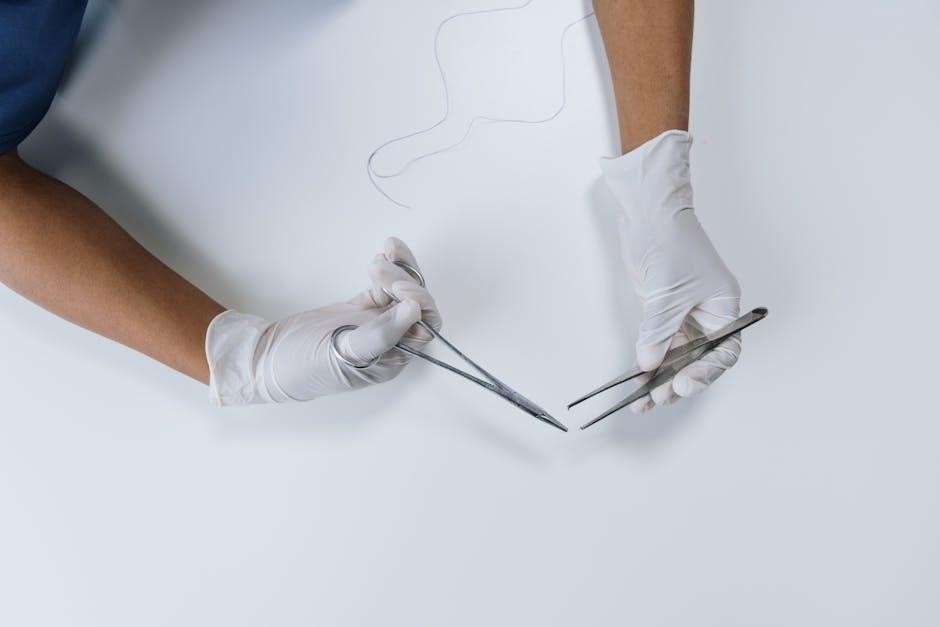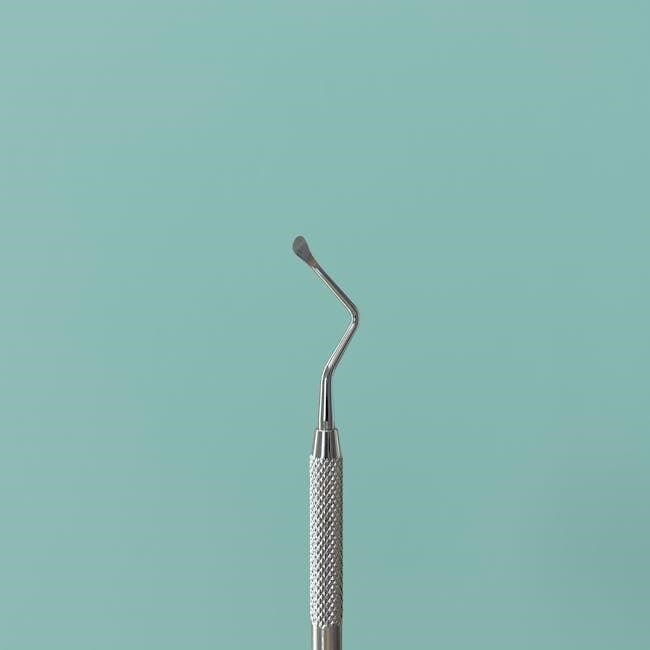Surgical instrument flashcards are essential tools for medical students and professionals, offering a concise way to learn and memorize various surgical tools and their uses․
What Are Surgical Instrument Flashcards?
Surgical instrument flashcards are educational tools designed to help learners memorize and identify various surgical instruments․ Typically available as PDF downloads or physical cards, they feature images or names of instruments on one side and descriptions, uses, or classifications on the other․ These flashcards are widely used by medical students, nurses, and surgical technicians to enhance their knowledge of instrumentation efficiently․
Importance of Flashcards in Surgical Education
Flashcards play a vital role in surgical education by providing a portable, interactive, and efficient way to learn surgical instruments․ They enhance retention and recall, allowing students to quickly identify tools in high-pressure environments․ Regular use improves familiarity with instrument names, functions, and classifications, preparing learners for clinical settings and standardized exams․ This method is particularly effective for visual and kinesthetic learners, making complex information more accessible and manageable․

Types of Surgical Instruments Covered
Surgical instrument flashcards cover basic tools like scalpels and forceps, as well as specialized instruments such as retractors, suction devices, and surgical staplers, ensuring comprehensive learning․
Basic Surgical Instruments
Basic surgical instruments include scalpels, forceps, retractors, and suction tips․ These tools are fundamental for making incisions, grasping tissues, and maintaining visibility during procedures․ Flashcards often highlight their functions and proper use, aiding in quick memorization․ They are essential for students and professionals alike, forming the cornerstone of surgical instrumentation knowledge․
Advanced and Specialized Instruments
Advanced surgical instruments include drills, punches, and microsurgery tools, designed for intricate procedures․ Specialized instruments like laparoscopic and endoscopic devices are also covered in flashcards, focusing on their unique functions․ These tools are crucial for complex surgeries, such as urology or neurosurgery․ Flashcards detail their uses, helping users differentiate between similar instruments and master their applications in specialized surgical settings․

Advantages of Using Flashcards for Surgical Instrumentation
Flashcards enhance retention and recall through active learning, making complex surgical instrumentation manageable․ They allow repetition and self-testing, improving mastery of instrument names, uses, and procedures efficiently․
Portability and Convenience
Flashcards are lightweight and easy to carry, offering convenience for on-the-go study․ They can be used anywhere, making them ideal for busy medical students and professionals who need to study efficiently without bulky textbooks․ Their compact size allows for quick review sessions, enhancing learning flexibility and ensuring that valuable study time is maximized․
Cost-Effectiveness
Surgical instrument flashcards are a budget-friendly learning resource, offering significant savings compared to expensive textbooks or courses․ Printable PDF versions allow users to create their own sets at minimal cost, while pre-made cards are often priced affordably․ Their reusable nature and ability to be updated or customized further enhance their value, making them a cost-efficient choice for medical students and professionals seeking to master surgical instrumentation․
Enhanced Retention and Recall
Flashcards are designed to improve memory retention through spaced repetition and active recall․ By testing oneself on instrument names and functions, learners reinforce their understanding and build long-term knowledge․ The visual nature of flashcards, often including images, further aids in remembering complex details, making them an effective tool for mastering surgical instrumentation efficiently and effectively over time․
Creating Your Own Surgical Instrument Flashcards
Gather materials like cardstock and printers, then design each card with instrument images and descriptions․ Print, laminate, and bind for durable, reusable flashcards tailored to your study needs․
Materials Needed
To create surgical instrument flashcards, you’ll need cardstock, a printer, scissors, a laminator (optional), and binder rings․ Download PDF templates or high-quality instrument images․ Use design software to format cards with instrument names and descriptions on one side and images or uses on the other․ Lamination ensures durability, while binder rings allow easy organization and portability for studying on the go․
Design and Layout Tips
For effective flashcard design, use high-quality images of surgical instruments on one side and concise descriptions on the other․ Ensure text is readable with a clear font size․ Organize cards by categories like basic or advanced instruments․ Use color coding for different types and include key features or uses․ Keep layouts simple and consistent to enhance focus and retention during study sessions․
Procedure for Printing and Assembling
Print flashcards on sturdy paper or cardstock for durability․ Use double-sided printing to display images on one side and text on the other․ Laminate cards for longevity․ Cut them evenly and consider binding with rings or placing in protective sleeves․ Ensure proper alignment and clear visibility of content during assembly․ Organize cards by categories or procedures for easy access and effective study sessions․

Popular Resources for Surgical Instrument Flashcards
Downloadable PDFs, such as Surgical Instrumentation Flashcards Set 1, offer comprehensive collections of instruments․ Online platforms provide additional resources, including customizable flashcard sets for various procedures․
Recommended PDF Downloads
Downloadable PDFs like Surgical Instrumentation Flashcards Set 1 offer detailed collections of instruments․ These resources include high-quality images and descriptions, ideal for printing and laminating․ A PDF with 46 veterinary instruments is also available, perfect for students․ Additionally, specialized sets cover microsurgery, plastic surgery, and urology tools․ These PDFs provide a portable and organized way to study, enhancing your mastery of surgical instrumentation․ Print them on cardstock for durability․
Online Platforms and Apps
Online platforms and apps provide accessible tools for studying surgical instruments․ Apps like flashcard databases offer over 2,700 instruments with real photos․ Customize flashcards for specific surgeries, such as microsurgery or urology․ Interactive features, like timed quizzes, enhance learning․ These digital resources complement PDF downloads, allowing users to study anytime, anywhere․ They are ideal for medical students and professionals seeking efficient and flexible study solutions to master surgical instrumentation․ Utilize these platforms for enhanced retention and convenience․
Best Practices for Using Surgical Instrument Flashcards
Use flashcards regularly, setting specific study goals․ Apply active recall and spaced repetition for better retention․ Combine with other resources for comprehensive learning․ Stay consistent and organized․
Study Techniques
Use active recall by quizzing yourself without looking at the answers․ Apply spaced repetition to reinforce memory over time․ Incorporate mnemonics to associate instruments with their uses․ Study in short, focused sessions and review consistently․ Utilize both visual and tactile learning by handling real instruments when possible․ Combine flashcards with other resources, like PDF guides, for a well-rounded approach․ Set specific goals for each study session to stay motivated and track your progress․
Common Mistakes to Avoid
Avoid infrequent practice, as consistent review is key to retention․ Do not neglect the real-world application of instruments, as theoretical knowledge alone is insufficient․ Over-reliance on digital tools without hands-on experience can hinder proficiency․ Rushing through flashcards without understanding their purposes is counterproductive․ Additionally, failing to cross-reference flashcards with actual surgical procedures can lead to gaps in practical knowledge․ Regularly review and correct misunderstandings to enhance retention and accuracy․
Procedure-Specific Flashcards
Procedure-specific flashcards cater to particular surgeries, such as neurosurgery or orthopedics, focusing on instruments used in those contexts․ They enhance targeted learning and preparation for specific surgical scenarios, improving familiarity with specialized tools and techniques․ These flashcards are ideal for residents and surgeons seeking to master instruments relevant to their field of expertise, ensuring precise and efficient performance in the operating room․
Customizing Flashcards for Different Surgeries
Customizing flashcards for specific surgeries allows learners to focus on the most relevant instruments for each procedure․ For example, neurosurgery flashcards might feature suction tips and drills, while orthopedic sets include bone cutters and splints․ This targeted approach enhances retention and ensures that learners are well-prepared for the unique demands of each surgical specialty, making study sessions more efficient and effective in clinical settings․
Examples of Specialized Flashcard Sets
Specialized flashcard sets cater to specific surgical fields, such as neurosurgery, orthopedic, or urology․ Neurosurgery sets include retractors and drills, while orthopedic sets feature bone cutters․ Urology flashcards often highlight endoscopic tools․ These sets enable learners to master instruments relevant to their specialty, ensuring focused and effective study․ They are organized by procedure type, making it easier to prepare for clinical scenarios and enhance surgical knowledge retention․

Case Studies and Success Stories
Medical students and professionals report improved surgical knowledge retention using flashcards․ Scalpels and forceps are among the most studied instruments․ Flashcards enhance exam preparation and clinical confidence, as highlighted in numerous success stories․
How Flashcards Improved Surgical Knowledge
Flashcards have revolutionized surgical education by enabling quick memorization of instrument names and functions․ Portable and visually engaging, they allow learners to master tools like scalpels and forceps efficiently․ Interactive learning through flashcards enhances retention, helping students and professionals recall critical details during procedures․ Many report improved exam scores and clinical confidence after regular use, making flashcards a cornerstone in modern surgical training․
Real-Life Applications in Medical Training
In medical training, flashcards are widely used for quick reference and active recall․ They help students identify instruments during surgeries and labs, fostering practical application of knowledge․ Many institutions incorporate flashcards into their curriculum, ensuring learners can recognize tools like retractors and suction tips instantly․ This method bridges theory and practice, enhancing surgical preparedness and competence among future healthcare professionals․
Future Trends in Surgical Instrument Flashcards
Future trends include digital integration with AI for interactive learning and augmented reality applications, enhancing visual and hands-on understanding of surgical instruments and procedures․
Digital Integration and AI
Digital integration and AI are revolutionizing surgical instrument flashcards by enabling interactive learning experiences․ AI-powered flashcards now feature real instrument photos, procedure-specific details, and smart study features like spaced repetition․ These tools allow users to generate custom flashcards instantly, enhancing memorization and recall․ AI also personalizes study sessions based on individual progress, making learning more efficient and tailored to specific needs, ultimately improving mastery of surgical instrumentation․
Augmented Reality Applications
Augmented reality (AR) is transforming surgical instrument flashcards by providing immersive, interactive learning experiences․ AR flashcards enable users to visualize 3D models of instruments, explore their features, and interact with them in real-time simulations․ This technology enhances understanding of complex tools, allowing learners to see how instruments function in actual surgical scenarios․ AR flashcards are becoming a powerful tool for modern medical education, bridging the gap between theory and practical application․
Surgical instrument flashcards are a proven, effective learning tool, adaptable to various study styles and evolving with technology like AR and AI, ensuring their continued relevance in medical education and training․
Final Thoughts
Portable and cost-effective, surgical instrument flashcards in PDF formats are invaluable for medical professionals and students․ They provide a concise way to study, enabling learners to memorize various surgical tools efficiently․ High-quality images and detailed descriptions aid in understanding instrument functions․ Their versatility allows customization for different surgical procedures, making them a crucial tool for both basic and advanced training․
Encouragement for Continuous Learning
Embrace surgical instrument flashcards as a lifelong learning tool․ Their portability and cost-effectiveness make them ideal for consistent study․ Customize sets for specific surgeries to deepen knowledge․ Regular review enhances retention and adaptability in dynamic medical environments․ Stay updated with new techniques and instruments to excel in surgical professions․ Dedication to learning ensures mastery and confidence in surgical practices․